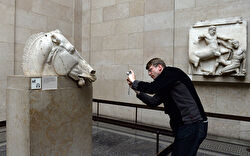
So Theresa May is — or perhaps is not — going to restore grammar schools to the secondary education system. The BBC said she told a meeting of the 1922 committee of backbench MPs this week that she will definitely not “turn the clock back on grammar schools”, which educated a minority of teenagers before new ones were banned in 1998. The Huffington Post thought this meant she had “finally confirmed she DOES plan new grammar schools”.
Thus fare those who mess with the current taste for “bring-backery”. When people talk of “bringing back” something — National Service, grammar schools, apprenticeships, or imperial measurements — what they mean is not necessarily the same as what they say.
On Friday the prime minister tried to clear things up by saying that the ban on establishing new grammars will be lifted, and, among other things, new faith schools encouraged. There is nothing inherently wrong with bringing back grammar schools, as long as there is an almost infinite capacity for recognising selection mistakes: 11 is a vilely young age for the state to decide a child’s fate.
Besides, great numbers of supposedly “comprehensive” schools are in effect selective, anyway, and there is no disputing that many of Britain’s postwar intellectual achievements (those which were not attributable to refugees) were the work of one-time grammar school pupils. Leadership of the teaching profession fell to grammar school enemies decades ago, but the schools were hugely effective in the minds of the brightest and the best.
There is nothing inherently wrong, either, in promoting apprenticeships, where the coalition government’s promises lamentably failed. And there is nothing wrong per se with taking seriously Prince Harry’s suggestion of reviving a form of National Service: provided that opportunities to serve involve something more altruistic than square-bashing and painting lumps of coal white, it would probably do a great deal to forge a more cohesive, mutually understanding society. I should certainly have been a better citizen for having a closer knowledge of others’ lives.
But we should recognise that this atavistic desire to resurrect defunct institutions is also a symptom of social necrophilia.
The success of the Vote Leave campaign in the EU referendum has set off a positive epidemic of the disease. “Take back control,” cried the Brexiters and, now we have got it: let’s revive the blue passport and abolish metric measures in schools and greengrocers.
What this all amounts to is an obvious attempt to turn the clock back. The blue passports, introduced in 1920, were big and stiff and instructed Johnny Foreigner to let the bearer pass “without let or hindrance”, on the say-so of “Her Britannic Majesty’s Principal Secretary of State for Foreign Affairs”. Their floppy burgundy replacements are horribly like the travel documents carried by the French or Romanians.
Inventing a travel document might be no more than a harmless parlour game chez-Farage. In reality it is more than that. Bringing back the blue passport promises to reinvent the UK of Nigel’s grandfather’s youth, long before some halfwit in the cabinet office’s propaganda wing decided to try to sell the country abroad with a lot of garbage about how “great” Britain is. There was no need for such nonsense in the days of the blue passport when everyone knew their place.
As for metric measurements, do not get me started, guv. Imperial measures — feet and yards, pints and quarts, pounds and stones — are the mark of a free and proud country. And if the gallon is good enough for the US, it is surely good enough for us. “A-ha”, learned readers will cry, “but the US gallon is different to our one”. And so it is, because it dates back to the measures of Queen Anne’s reign, while the British redefined theirs in 1824. Current UK legislation defines imperial measures like the yard or gallon by reference to metric quantities. Not even the UK Independence party is crying out for the return of measures such as the bovate, peck or pottle.
Needless to say the roots of our national decline can be found in the 1960s when the whole country started to go pear-shaped. Most “bring backery” follows a similar prospectus.
If only we could restore the old institutions, Britain would once again be a prelapsarian paradise. If only.
Of course England was a different country when, instead of overpaid spoilt brats, football was dominated by figures in long shorts who played 90 minutes for a few bob and a cup of tea, and did not badmouth the referee. But were those wheezy, monoglot spectators really much better off for their imperial measures and schooling at the local secondary modern?
Politics ought to be about improving the lives of the citizens. Some of the changes of the past few decades have been based on common sense and logic (metric measures). Some (comprehensive schools) have been the consequence of ideology. And some (withdrawing bobbies from the beat) the result of “modernising” by unimpressive chief constables.
But something has changed in this much-altered nation. Britain has been walking backwards into the future, convinced that its best years were behind it, for the best part of a century. That is rubbish. For most people, life has never been better.
Where do we stop with this desire to brings things back from desuetude? Most of the angry newspaper correspondents from Southport or Leamington Spa who thundered about the need to “bring back the birch” are presumably banging on to St Peter about it.
They got nowhere because the political class shrugged this off condescendingly and did nothing to change the law. But the referendum result has emboldened the masses, who defied what the overwhelming majority of politicians told them to do. They have tasted blood.
Jeremy Paxman is an FT contributing editor. Illustration by McHugh.
Article courtesy of The Financial Times. Original found here.



